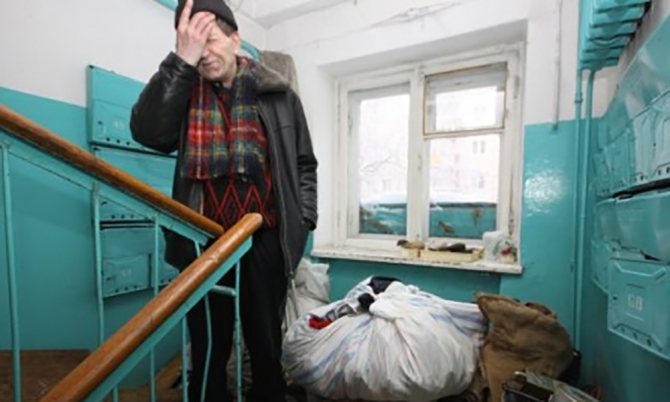Why they may refuse to privatize an apartment: reasons, grounds
All reasons for refusal can be divided into 2 categories: justified and unjustified. The first, as the name suggests, are a consequence of the legislation not being properly understood by the applicant. They are absolutely legal and it will not be possible to bypass the privatization of real estate - first you will have to eliminate the reasons.
Unreasonable reasons for refusal are not specifically indicated anywhere and, in fact, such a list cannot exist in principle. According to general rules, this includes any grounds that are contrary to current legislation. Some of them can be corrected “on the spot,” but the easiest way is to immediately go to court and thus protect your own rights.
Regardless of which category the reason falls into, it must be indicated in the written refusal to privatize. If this paper is not issued, it must be requested. Otherwise, it will be difficult to prove something in court. Actually, how to fix the problem, because it will remain unknown.
Justified reasons for refusal
Justified reasons for refusal to privatize, in turn, can be divided into external (those that do not directly depend on the applicant, most often related to the characteristics of housing) and internal. The latter are already connected directly with the person himself, his superficial approach to the procedure or the desire to “bypass the system.”
External reasons for refusal to privatize
This category includes reasons related to the ban on the privatization of certain objects, which automatically implies a refusal to privatize such real estate. It is impossible to privatize:
- Real estate in gated communities.
- Corporate facilities.
- Dorm rooms.
- Emergency and dilapidated housing subject to demolition.
- Real estate withdrawn from circulation.
Corporate housing and dorm rooms, in fact, like any other real estate, can be transferred to the balance of the municipality, after which they can be privatized on a general basis.
Internal reasons for refusal
The second group of justified reasons for refusal of privatization is directly related to the applicant. These include:
- Absence of all or part of the required documents.
- Errors in documents.
- Forgery of documents (besides, this is also a criminal offense).
- Illegal redevelopment of housing.
- Absence of a concluded social tenancy agreement.
- Refusal to participate in privatization is not certified by a notary.
- An attempt to re-privatize (this is only possible once in a lifetime).
Among other things, this also includes fundamental disagreement with privatization on the part of one of the residents. Without the consent of all (or obtaining notarized refusals to participate in the procedure) people registered in the housing, it is impossible to carry out the procedure.
The only way to cope with this problem is to convince the dissenter in any way of the need for these actions. As an alternative, the option of discharging a person from housing can be considered, but this only works in individual cases when all the factors coincide.
Unreasonable reasons
It is logical that any other reasons can be considered unfounded. The most common example is having debts on rent for housing. Formally, if you follow the letter of the law, this cannot be a reason for refusal, since nothing like that is said anywhere.
But in fact, such a debt automatically passes to the municipality, with which it categorically disagrees. As a result, even when trying to solve the problem through the court, a person is still usually obliged to first pay all debts (or, at a minimum, transfer them to himself personally) and only then repeat the attempt at privatization.
Most often, it is with unfounded reasons that the most problems arise. Sometimes they even refuse to issue a written refusal. It must be required, since without this document it will be almost impossible to prove something to someone.
Basics of the procedure
Citizens of the Russian Federation living in municipal housing on the basis of a social tenancy agreement have the right to privatize their housing, receiving square meters with the right of ownership and disposal. All persons named in the previously mentioned act have equal rights to living space. However, free participation in the alienation of square meters is allowed once in a lifetime from the moment of adulthood. To complete the transaction, each of the employers must give their consent. The exception is minors. Their consent does not need to be confirmed. Temporarily absent tenants (conscripts, convicts, persons on long-term business trips, etc.) have equal rights with adult residents registered at the address. They also agree on the procedure by involving a representative who has a notarized power of attorney.
If a person does not want to receive ownership of housing for any reason (condition, area, etc.), then he needs to form a refusal to participate in the transaction. The latter is in fact a consent to privatization without the participation of one of the employers. Such a document must be certified by a notary office. If parents draw up this document on behalf of a minor, then they will need to obtain permission from the guardianship and trusteeship authorities.
Important! The absence of one of the above-mentioned consents is recognized as a valid reason for refusal of privatization by the municipality or for challenging the transaction (its cancellation from the moment the agreement is signed).
The municipality’s refusal may also be due to the fact that the housing is not subject to alienation into private hands. This fund includes service apartments, student dormitories, other specialized areas, as well as square meters located in emergency and dilapidated buildings. These standards are enshrined not only in local legislation, but also at the Federal level. The main regulatory legal act on the issue of privatization of municipal and state housing is the Law of the Russian Federation dated July 4, 1991 No. 1541-1. According to the latest amendments, the procedure will be carried out indefinitely.
What to do if privatization is refused?
If privatization is refused, then there are two solutions: correct the reason or go to court. In the case where the reason is justified, there are virtually no options - you need to correct the reason, since going to court will not yield anything. But in the case of unfounded reasons, it is necessary to consider each situation individually.
Example : Let’s assume that the reason for the unjustified refusal was the requirement to provide the applicant’s international passport. This document is not required by law, but if you have it on hand, it is much easier and faster to attach it to the rest of the documents and continue privatization. But if it is not there or the requirements are, in principle, such that it is extremely difficult (or even impossible) to fulfill, then you cannot do without going to court.
Procedure
There is no strictly defined procedure for solving the problem of refusal to privatize, but if you follow logic and the law, then an approximate step-by-step instruction may look like this:
- If the problem is justified, correct the cause. No options.
- If the problem is unfounded and the cause can be easily eliminated, it’s easier to do so.
- If the problem is unreasonable and the cause is difficult or impossible to eliminate, you need to go to court.
- To go to court, you must request a refusal in writing.
- Complete an application (see sample below).
- Submit an application to the court.
- Pay the state fee.
- Wait for the meeting date.
- Participate in the consideration of the case.
- Get a court decision.
- Wait until it takes effect.
- Act in accordance with what the decision says.
Procedure
If it is impossible to solve the problem “in an amicable way,” that is, without involving the court, then you need to prepare for this procedure very carefully. The easiest way is to hire an experienced lawyer who will do everything for the applicant. As practice has proven, this approach can significantly increase the chances of success and reduce time/effort.
You must first request a written refusal. This has already been said several times, but since it is on the basis of this document that the whole matter will be built, it would not be out of place to remind you again. Even if the applicant is embarrassed or is directly denied the issuance of this paper, it must be demanded. Up to the point of contacting the authorities. As a last resort, you can record it on video (although this is often prohibited).
Based on the refusal (or video), a statement should be drawn up. It must honestly indicate all the factors and reasons for going to court. Documents are attached to the claim (see below for more details) and all this is sent to the court together.
There are several options: bring it in person or send it by mail. The second option is simpler and faster, but the first is much more reliable. Especially if you request from the receiving party a copy of the submitted document with a receipt stamp. Here no one can ignore the claim allegedly on the grounds that it “did not arrive” or “was lost.” The second factor can still be used, but it will now be much more difficult to justify.
When submitting an application, you must pay a state fee. It is necessary. In theory, compensation can then be demanded from the defendant, but the amount is small and there are many problems, so there is not much point. The receipt is issued in court. With its help, in any bank (or online, but preferably through a bank), we pay the state fee and attach a receipt with the bank’s marks to the application.
After that, all that remains is to wait for the court hearing. You definitely need to attend it. In practice, almost 50% of all cases were closed in favor of the person who was present at the trial, provided that there was no representative of the other party. Of course, this only applies to controversial situations, but it is always better to increase your chances by any available means.
After receiving the decision, you need to wait until it comes into force. Most often, 1 month is given during which the other party can file an appeal. And only after this can one demand that the conditions of the decision be fulfilled.
Statement of claim and documents
The application is drawn up based on the requirements of Article 131 of the Code of Civil Procedure of the Russian Federation. An example of such a document:
The application must be accompanied by approximately the following package of documents:
- Applicant's passport.
- Birth certificates of children (if available).
- Receipt for payment of state duty.
- Refusal to privatize.
- Extract from the Unified State Register of Real Estate and the house register.
- Social tenancy agreement.
In some cases, the list may be more extensive. The easiest way to determine this is with the help of an experienced lawyer. If you solve the problem yourself, then you need to be guided by the rule: more is not less. The more papers attached to the application, the better. The main thing is that they at least somehow relate to the problem.
Expenses
When submitting an application, you need to pay a state fee - this will be the only type of expense. Despite the fact that the question actually concerns property, it relates to non-property, because it is necessary not only to demand ownership of housing, but to challenge the refusal to privatize - and these are two different concepts. As a result, based on clause 3, clause 1, article 333.19 of the Tax Code of the Russian Federation, you only need to pay 300 rubles.
Deadlines
The legislation does not have specific deadlines for considering such cases, so everything is very individual. In practice, on average, an application is considered for about 2-4 months. Sometimes longer, but less – extremely rarely. And you should wait about 1 month until the decision comes into force. Mainly because of such significant time frames, it is recommended, if possible, to solve the problem “in an amicable way.” Of course, when this is possible in principle.
Arbitrage practice
Example No. 1 : Sidorov P.E. filed a lawsuit demanding that the refusal to privatize be declared unfounded. The document states that the refusal occurred due to the fact that the applicant was not registered at the specified address for a long time. However, Sidorov P.E. provided documents indicating that all this time he was on a long business trip. During his absence, the applicant's wife remained registered in the apartment. Having considered all the features of the case, the court, guided by Law No. 1541-1, which does not indicate that a long-term absence of registration at the address of a potentially privatized property can be considered grounds for refusal, decided that the plaintiff’s claim was justified. The refusal was declared unlawful and now Sidorov P.E. has the right to re-submit documents for privatization.
Example No. 2 : Nikolaev I.P. filed a lawsuit demanding that the refusal to privatize be declared illegal. The municipality points out the fact that the apartment has significant rent arrears. The court recognizes that Law No. 1541-1 does not indicate that this factor can be considered a basis for refusal, however, at the same time, the social tenancy agreement states that the tenant is obliged to pay all bills. By agreement with the plaintiff and defendant, it was decided that Nikolaev I.P. must first pay all debts and only then apply for privatization. Otherwise, the social tenancy agreement may be terminated due to the tenant's failure to fulfill his obligations.
Refusals to privatize are quite common, but often the reason for this is quite justified. At the same time, if it is outright illegal, it may be difficult to solve the problem on your own. During a free consultation, our experienced lawyers will clarify all controversial issues, and acting as representatives in court, they will be able to turn the situation in favor of the client.
FREE CONSULTATIONS are available for you! If you want to solve exactly your problem, then
:
- describe your situation to a lawyer in an online chat;
- write a question in the form below;
- call Moscow and Moscow region
- call St. Petersburg and region
Save or share the link on social networks
Author of the article
Natalya Fomicheva
Website expert lawyer. 10 years of experience. Inheritance matters. Family disputes. Housing and land law.
Ask a question Author's rating
Articles written
513
- FREE for a lawyer!
Write your question, our lawyer will prepare an answer for FREE and call you back in 5 minutes.
By submitting data you agree to the Consent to PD processing, PD Processing Policy and User Agreement
Useful information on the topic

2
How to evict your roommate from your apartment
Neither legal nor civil marriages provide guarantees of long and...

3
Is it possible to evict tenants in winter?
Renting out an empty apartment is quite a profitable business, especially...

1
Privatization of land under an apartment building
You can privatize not only a separate residential building, apartment or land...

Privatization of an apartment with debts on utility bills
Debts often become the main reason for refusing privatization, thereby...

4
How much does it cost to privatize an apartment?
Privatization of an apartment is a free procedure, but only within the cost...

Demolition of privatized housing
Any housing, including privatized, under certain conditions...










